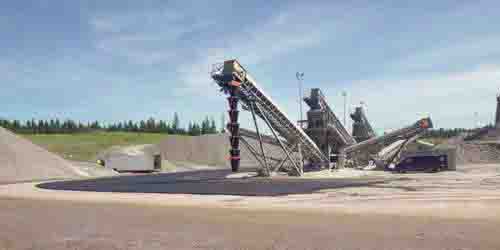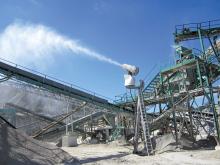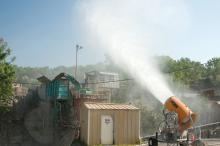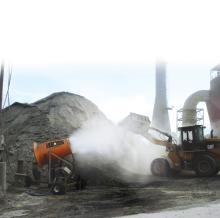
Controlling dust is increasingly important for quarry operators and, today, they are helped by a range of solutions. Patrick Smith reports.
Fewer dust emissions mean lower clean-up costs, and reduced need for maintenance, service and repair work all over the quarry plant.
This is the view of
Indeed, the company lists a host of benefits following the global launch of its new WE6000i telescopic chute.
“Based on the WE series, the chute has been developed to be fed by conveyors with a belt width of less than 800mm, and its features minimise dust emissions, boosting the operational efficiency of the site, as well as benefitting the environment of the workplace and surrounding areas,” says Sandvik.
“Using a telescopic chute also reduces stock pile segregation and improves product quality. Our new WE6000i telescopic chute has been designed to prevent the emissions of dust and loss of material, thereby improving operational efficiency and the environment in which it is used.”
A key feature of the chute that enables it to produce such benefits is that a vacuum is created inside it by the material flow, reducing the requirement for expensive, service demanding filtration systems.
The WE6000i telescopic chute is designed to be used in a variety of areas and applications, with the design of the chute being both simple and rugged.
“It possesses an extremely good ratio between minimum and maximum length, with the number of conical chute segments varying depending on the height of the stockpile and that of the feed conveyor,” says Sandvik.
The WE6000i telescopic chute can be operated from the control panel, via a programmable logic controller (PLC) with automatic level sensor, or manually via remote control. It senses its height above the material stockpile and automatically adjusts, minimising the risk of dust emissions. In addition, the wire winches are equipped with limit switches.
It has a modular design, and along with all of the WE series of telescopic chutes, allows for a choice of materials to be used in different applications.
“The construction of the chute segment is optimised for flexibility, long life and material flow. This user-friendly design enables easy maintenance, providing savings for operations wherever it is used.”
“We’ve got very good expectations for that market,” says Alverman Soster, the dust division manager of EmiControls, based in Bolzano, north-east Italy. “There’s competition there but our range will suit North American customers. We now have a dealer who will sell to customers across the United States and Canada. The dealer already sells solutions from other dust control companies, but they are different to what we offer. We’ve already got an order for two machines.”
Part of the
Described by EmiControls as the V12 dust-laying sprayer’s little sister, The V7 has a patented nozzle head fitted in the axial direction in the turbine and achieves a much higher projection range than comparable nozzle configurations. It has a booster pump and can therefore also be used with the turbine switched off.
The user-friendly remote control system, the 52° tilt angle, 360° pivoting angle and the booster pump with automatic protection against freezing and running dry all combine to make the V7 into a reliable, flexible and compact dust-laying sprayer.
The L3 lance is the first dust-control lance on the market. It is a compact and user-friendly solution for close-range applications. It works without a turbine, allowing it to reach to the source of dust. The spray action can be narrow and flat, fan-shaped or cylindrical, depending on the requirements in any given case.
In 2017, EmiControls plan to launch new versions of the stationary or mobile application-suited V22, its most powerful dust-suppression machine due to its long projection range and integrated 360° pivot function, and the all-purpose, powerful and environmentally-friendly V12 dust-control solution. Testing of the prototypes is currently being carried out by customers and at the firm’s HQ.
Soster says: “Our idea is to have one single low frame for both models. You will see some improvements in the speed of the turbine rotation and the tilting capability of the cannon.
“Being part of the TechnoAlpin Group means EmiControls is part of a very big company. It allows us to utilise their production capability and keep manufacturing in-house. Through TechnoAlpin, we can also offer model servicing and maintenance to our customers 24-7. The company’s expertise on the North American market, through its Colorado subsidiary, also help us with our plans there.”
As part of its ambitious growth plans, EmiControls is also looking to sell its range into Russia and South Africa. “We’ve already done a quotation, among others, for a potential customer at Vladivostok port in south-east Russia. Our Russian dealer has done a lot of research and thinks our dust control model range is ideal for the many quarries, ports, energy plants and recycling sites across the country. Concerns over employees being subjected to high levels of workplace dust are growing, as are efforts to address them. It’s the same situation in Poland, where we recently established a distributor.”
Meanwhile, global dust suppression technology provider,
It successfully employed an atomised mist dust suppression system to control air quality in and around its Chula Vista plant where, after upgrading the dust suppression from a sprinkler system to a DustBoss DB-45, operators report a substantial air quality improvement in the material receiving area.
Dozens of dump trucks deliver daily recovered pavement from projects all over the San Diego area to the Chula Vista site, with material being offloaded onto a dry earth receiving area and then immediately moved by loader to the crusher or into storage piles.
“The offloading process creates a tremendous amount of dust, and that was causing issues for our neighbours who run large vehicle salvage lots,” says Robert Erautt, facilities manager.
Company officials chose the DB-45, which is able to throw its atomised plume 150feet (nearly 46m) to deliver effective dust control over a 1,115m² area. When equipped with optional 359° oscillation, the design can cover as much as 16,875m² from a single location.
The mist is created by a stainless steel manifold with 18 atomising nozzles delivering 5.52bar of pressure, propelling millions of droplets with an 510m³/minute industrial fan. The DB-45 delivers a dense curtain of water droplets atomised to a 50-200 micron size range, which creates the greatest attraction to most dust particles.
“The size range is critical to avoid the slipstream effect that large droplets from sprinklers have on airborne dust particles,” says Laura Stiverson, DCT president.
“In most applications, fugitive particles are generally around 50-100 microns in size, but water droplets from a sprinkler are much larger, often 2,000-6,000 microns.
“The velocity of the large sprinkler droplet affects the airflow, and when an airborne particle approaches it, the flow often deflects the particle without a collision between dust and droplet.”
In contrast, the atomised mist system creates droplets that are much closer in size to the dust particles, which encourages the necessary contact to bring dust particles to the ground.
While large sprinklers can apply 500 gallons/minute (2,273litres/minute) or more, DCT says that the DB-45 puts out just 11.3 gallons/minute (51.4litres/minute), helping RAI prevent mud and minimise run-off.
“On hot dry days, which we get a lot of around here, a little breeze can carry dust a long way. We just turn on the atomiser and you can see the mist pull the dust out of the air. The unit is on a metal carriage, so we can adjust its position if the wind changes, but generally it stays in one place.
“Our goal is to reduce as much material going into landfills as possible. Recycling material is just good business, but it shouldn’t come at the expense of air quality. At our processing centres or out on a project site, a clean and efficient operation that includes dust control keeps the community and clients happy. It’s good for everyone in the end.”
Dust Control Technology has also introduced DustBoss DB-100 Fusion, its new and largest trailer-mounted dust control system, a powerful atomised mist design featuring a range of 100m and the ability to deliver 15,500m² of coverage area.
Powered by its own 150kW generator with a 6.8litre







